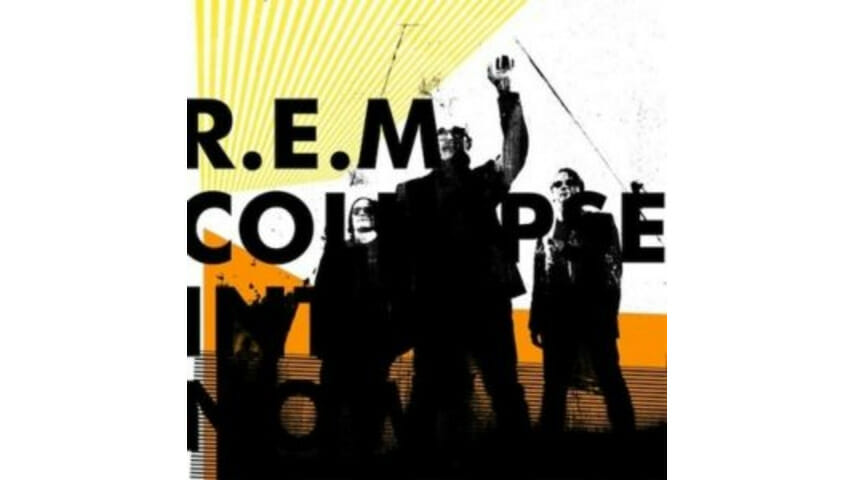
“Hey now, take your pills,” Michael Stipe sings pensively on “Überlin.” “Hey now, make your breakfast.” If the cadence of those lines and the melody of that song remind listeners of R.E.M.’s 1992 single “Drive,” the resemblance is certainly intentional. The band’s 15th album, Collapse Into Now, is littered with references to their mighty back catalog: “Alligator Aviator Autopilot” crashlands into “Wake-Up Bomb,” and closer “Blue” churns the same amelodic dirge as “Country Feedback,” completely with Stipe’s delivery straddling talking blues and poetry slam. On “Oh My Heart,” he sings, “The storm didn’t kill me, the government changed,” updating the lyrics of “Houston” from the Bush to the Obama administration.
This is not an act cannibalizing itself for easy radio play or to remind fans of past glories. Rather, R.E.M. are simply engaging with the past and collapsing it into now, as a means of acknowledging that their songs derive from a single collective perspective, one that has aged but hasn’t really changed. Thirty years into a career, the trio view themselves as a band with a still-developing narrative arc rather than alt-rock vets smiling through oldies and charging their graying fans exorbitant ticket prices. Why ignore the 14-album monster in the corner, especially if this self-referentiality allows them to age gracefully without growing old?
Such close communion with their past allowed R.E.M. to sound rejuvenated on 2008’s Accelerate, which became their de facto comeback for no other reason than it didn’t suck as hard as Around the Sun. But it was no return to form, mainly because the band have no form to return to, no specific aesthetic to reclaim. Their catalog is not only enormous, but also impressively diverse, ranging from collegiate folk rock of their IRS Records albums to lusty glam rock of Monster to quiet ambient of Up. On Collapse, the band recognize the futility of trying to recapture those past glories and take an approach similar to New Adventures in Hi-Fi, which sampled past sounds and never settled on any one as “official.” Collapse shuffles through all of R.E.M.’s past lives; it’s a greatest hits without a hit, a career retrospective with all new material.
Again, the band chose to work with producer Jacknife Lee, who gave Accelerate its supercharged, just-shy-of-Monster roar. He sounds like he’s arming the band for the loudness wars, which means that everything on Collapse has been collapsed and compressed into what might be described as a fence of sound, not a wall. Their engagement with older material occasionally invites unfavorable comparisons: Compared to “Country Feedback,” which wrapped listeners up in an old quilt and told them ghost stories, “Blue” sounds too slick to sell Stipe’s lyrics about the wreckage of the 20th century. Even with Patti Smith’s eloquently brooding vocals, the song’s gravity sounds painted on—less an affectation than an approximation. Despite their loyalty to Lee, fans may find themselves wondering what someone like Tucker Martine could do with the mandolins and accordion of “Oh My Heart” or what David Barbe could do with the strummed ruminations of “It Happened Today.”
That is, to some extent, Stipe’s own fault. Over the last decade, his songwriting has grown increasingly demonstrative. Life-affirming has become his default mode, and it doesn’t always suit him. Once he used to mumble his lyrics, as if meaning was something listeners inferred rather than something he enforced, but especially on Collapse, Stipe wants to make sure you get every single word. His songs have become declarative statements rather than inquisitions or ponderings, which makes “That Someone Is You” and “Every Day Is Yours to Win” little more than musical pep talks. There’s little mystery to these songs—nothing unknown or unresolved or open-ended, which is precisely what keeps so many fans going back to their older material. We listen to “So. Central Rain” and “The One I Love” and “Drive” to try to make sense of them, and Stipe seems to sing them as if he is doing the same. On Collapse, the sense is pre-made before you even hear the songs.
And yet, the album has moments of such promise that it’s easy to overlook its shortcomings. Peter Buck’s chiming guitars lends “Discoverer” its heraldic immediacy, pulling you forcefully into the album, and Stipe disconnects his vocals from the song’s meter to convey a jittery excitement. With its lulling chorus, “Oh My Heart” strikes the right balance between bitter and sweet, and “All the Best” delivers the short sharp shock of the band’s most brazen rockers. A poignant soul ballad, “Walk It Back” wraps its syncopated theme around Stipe’s vocals, suggesting a tragically insoluble predicament and tangled regrets.
Ultimately, there is something strangely courageous about this album and R.E.M.’s determination to avoid nostalgia act status, even amid so many reissues (which may coincide with the death of the CD form than with their creative abatement). If they’ve stumbled in the past, the band are no longer ignoring their confusion, but embracing it and making it part of their mythology. They don’t know what comes next, but like us, they’re always curious to hear the next R.E.M. album.